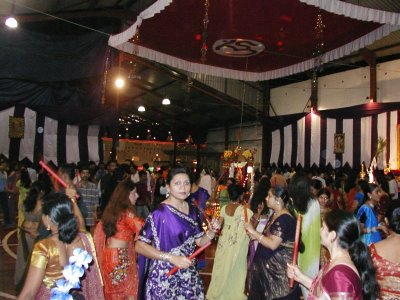GARBA!!
Tonight Zeebah dancers went to the Haslett Hindu Temple to celebrate the Festival of Navarati with our Indian friends. It started around 6:30 and we stayed until midnight.
Garba is an Indian form of dance that originated in the Gujarat region of India. Unlike other famous types of Indian dance, Garba is much more similar to Western social dancing than the presentational style of the others. The greatest difference between Garba and western social dancing is that it is circular and is religious in origin. The name Garba comes from the Sanskrit term Garba Dip. Garba, when translated, most closely resembles the English preposition inside, and Dip is a small earthenware lamp. For this reason, many traditional Garbas are performed around a central lit lamp. Traditionally, it is performed during a 9 day festival called Navarātrī (Nava = 9, rātrī = nights). Navarātrī celebrates the Goddess Amba as well as other popular Hindu gods and goddesses. This festival, most commonly celebrated by women, that celebrates the Hindu Goddess Amba, the Mother Goddess. Traditionally, either the lamp (the Garba Dip), or an image of Amba is placed in the middle of the concentric rings deliniating the dance, as an object of veneration. People dance around the deity clapping rhythmically. At every step they gracefully bend sideways, the arms coming together in beautiful sweeping gestures, up and down, left and right, each movement ending in clap. Modern Garba is also heavily influenced by Dandiya, a dance traditionally performed by men, and from which the sticks originate. These sticks, which can vary from 1.5 to 2 feet in length, and is meant to represent the sword of the avenging Goddess Durga . The merger of these two dances has formed the high-energy, exciting dance that is seen today. I found this dance to be the highlight of the night even though I was dead tired because it was easy to get lost in the amazing drums and the rhythmic sounds of the sticks. (info from Wikipedia)

Garba is an Indian form of dance that originated in the Gujarat region of India. Unlike other famous types of Indian dance, Garba is much more similar to Western social dancing than the presentational style of the others. The greatest difference between Garba and western social dancing is that it is circular and is religious in origin. The name Garba comes from the Sanskrit term Garba Dip. Garba, when translated, most closely resembles the English preposition inside, and Dip is a small earthenware lamp. For this reason, many traditional Garbas are performed around a central lit lamp. Traditionally, it is performed during a 9 day festival called Navarātrī (Nava = 9, rātrī = nights). Navarātrī celebrates the Goddess Amba as well as other popular Hindu gods and goddesses. This festival, most commonly celebrated by women, that celebrates the Hindu Goddess Amba, the Mother Goddess. Traditionally, either the lamp (the Garba Dip), or an image of Amba is placed in the middle of the concentric rings deliniating the dance, as an object of veneration. People dance around the deity clapping rhythmically. At every step they gracefully bend sideways, the arms coming together in beautiful sweeping gestures, up and down, left and right, each movement ending in clap. Modern Garba is also heavily influenced by Dandiya, a dance traditionally performed by men, and from which the sticks originate. These sticks, which can vary from 1.5 to 2 feet in length, and is meant to represent the sword of the avenging Goddess Durga . The merger of these two dances has formed the high-energy, exciting dance that is seen today. I found this dance to be the highlight of the night even though I was dead tired because it was easy to get lost in the amazing drums and the rhythmic sounds of the sticks. (info from Wikipedia)




0 Comments:
Post a Comment
<< Home